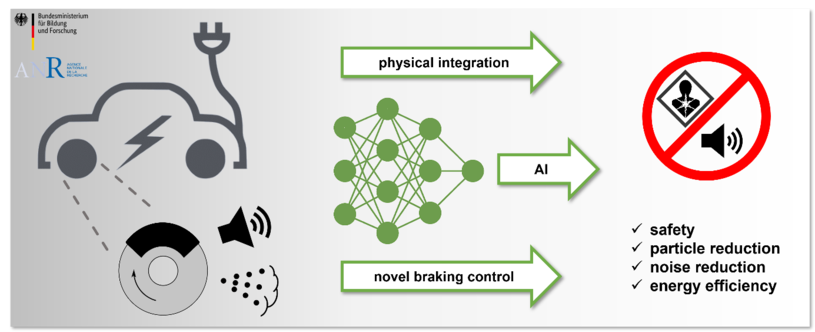PI-CUBE: AI-based emission reduction of electric vehicle braking systems
The Dynamics Group (Charlotte Geier and Merten Stender) is involved in a Franco-German 3-years research project on artificial intelligence and mechanical systems funded by Bundesministerium für Bildung und Forschung. The project aims at a next generation AI-driven brake system control strategy for environmentally friendlier electric cars. PI-CUBE is one out of 21 projects selected out of ~150 proposals.
Electric vehicles (Battery Electric Vehicles - BEVs) represent an essential building block in the technological shift toward resource-efficient transportation. Without combustion engines, drive emissions can be reduced drastically, but particles emitted by friction brakes remain a source of potentially harmful dust and a source of noise in the form of "brake squeal". Even if BEVs are decelerated by energy recovery, a friction brake will still be needed in the future for braking to a standstill.

The joint project "PI-CUBE" (Physics-informed Artificial Intelligence for Cutting Brake Emissions from Electric Vehicles) aims to develop a novel artificial intelligence (AI) braking control for BEVs to suppress or significantly reduce particulate and noise emissions. AI prediction models for the expected loads during the next braking determine the risk of greatly increased emissions, e.g. in urban traffic. Based on this information, critical operating points are bypassed using purely data-driven balancing of the electric and mechanical brakes. In this way, braking continues to be safe, but potentially harmful emissions and noise are bypassed. Depending on the driver and vehicle, the condition and operation of the brakes is highly individual - and so is the emission behavior of the brakes along the product life cycle. Therefore, a continuous learning module is being developed in this project, which intelligently adapts the brake control to the very different driving profiles and braking events. Only in this way can a maximum reduction of emissions be achieved in order to achieve health-friendly and environmentally friendly mobility. This project integrates AI with physical simulations and mechanical systems to enable rapid transfer of the latest research results into real products.
Three German and two French partners are involved in the project: Two university partners, namely the Dynamics Group of TUHH in Hamburg, Germany, and the Laboratory of multi-scale and multi-physics mechanics (LaMcube) in Lille, France. The industrial partners are Hitachi Astemo on the French side, and Audi AG and Volkswagen AG on the German side.

